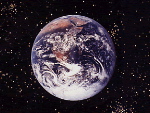(the authors are from universities in Belgium, Germany, and the Netherlands)
The world should not be identified with the earth, nor with the cosmos, nor with the observable universe, but with the totality in which we live and to which we can relate ourselves in a meaningful way.
A world-view is a coherent collection of concepts that allow us to construct a global image of the world, and help us understand our experience in it. We construct a world-view from our inner experience and our practical dealings with things, as well as from the interpretation of history and of scientific knowledge about our world.
The main properties of a world-view are coherence and fidelity to experience. A worldview can only be faithful to real experience if it does not contradict rational knowledge.
Some basic
questions that require answers are:
What is the nature of our world? Why is our world the way it is,
and not different? Why are we the way we are, and not different?
Are there general principles by which we should organize our actions
in the world? What is the future of our species?
No matter how important facts may be, we are not satisfied with merely "knowing" them. We also want to "understand," gain "insight" into and explain them. We always seek an answer to the question "why?"
We need to construct a coherent world-view so that we can orient ourselves in a meaningful way in our world. Our “world” is slowly becoming the whole universe.


